
Woman Viciously Trolled Online After Sharing A Day Of Cooking And Eating The “Ancestral Diet”
In the age of Instagram filters and food fads, an influencer named Gretchen Adler has taken a decidedly different approach that has left her audience both fascinated and puzzled.
The 38-year-old California mom captivated millions with her “ancestral diet” posts, which she brands as a return to natural, unprocessed foods.
Under the Instagram handle @gretchy, the content creator posted a video sharing every meal and drink she consumed in a day. The video, posted in May, garnered more than 5.7 million views as she explained how she avoids “seed oils, artificial sugars, dyes, and preservatives at all costs.”
- Gretchen Adler garnered 5.7 million views for sharing her "ancestral diet" on Instagram.
- She said the diet avoids “seed oils, artificial sugars, dyes, and preservatives at all costs.”
- Critics of the diet noted the irony in calling supplements and smoothies "ancestral."
- Gretchen said she aims to inspire others to make foods from scratch for better health, despite naysayers.
The Instagrammer revealed that her day begins with a ritual that feels almost sacred: a glass of filtered water with fresh lemon, followed by a cup of coffee brewed from “organic mold-free beans” and enriched with raw cream.
Breakfast is a hearty affair with homemade sausages crafted from 100% grass-fed beef paired with eggs from pasture-raised hens.
Gretchen Adler’s video explaining her “ancestral diet” garnered more than 5.7 million views on Instagram
Image credits: gretchy
Image credits: gretchy
Accompanying her protein-rich meals are some freshly baked sourdough blueberry muffins made from scratch. She also washed down a Prenatal Ancestral Supplement, causing some of her followers to raise their eyebrows.
As midday approaches, the internet star blends a vibrant probiotic smoothie. The concoction includes raw kefir, homegrown frozen peaches, and tamarillos, and it is garnished with bee pollen.
Dinner in her household features a comforting bowl of chicken noodle soup, which is made from scratch with the same care and attention to ingredient quality. The meal concludes with a slice of raw cheesecake.
Gretchen’s diet stirred a bit of controversy in the comments section.
“Ancestors didn’t drink smoothies due to lack of nutribullet,” said one critic, while another wrote, “This breaks my brain how this isn’t satire.”
“Ahhh yes. The ancestral coffee, ancestral muffins, the ancestral vitamin pills…. All the things our ancestors had,” another sarcastically wrote.
The 38-year-old mom explained that she avoids “seed oils, artificial sugars, dyes, and preservatives at all costs”
Image credits: gretchy
Image credits: gretchy
Singer SZA also commented, saying she was “Disturbed and delightfully intrigued.”
Gretchen didn’t pay heed to her naysayers and said their comments are reflective of how people have become immensely accustomed to having processed foods as part of their meals.
“The people who think this is a joke—very telling of the times,” she told Newsweek. “We have veered so far from what real food is that people now think eating and preparing nutrient-dense foods is a joke. Ultra-processed foods are considered the norm and are foods I, myself, wouldn’t consider as foods.”
“Our nation has a health epidemic and obesity, diabetes, and cancer rates have never been higher. One must wonder why,” she added.
Her diet was also controversial because raw dairy products, which she regularly consumes, are illegal in some states due to the risks of unpasteurized milk.
The California Department of Public Health advises against raw dairy for children, pregnant women, the elderly, and those with weakened immune systems.
The Californian’s protein-rich meals included sourdough blueberry muffins and also a Prenatal Ancestral Supplement
Image credits: gretchy
Image credits: gretchy
Since the advent of modernization, processed foods have become a staple in the American diet due to their convenience, affordability, and long shelf life. The fast-paced lifestyle of many Americans demands quick and easy meal options, and processed foods offer just that.
However, the reliance on these foods can be harmful, as they are typically high in added sugars, unhealthy fats, and sodium while being low in essential nutrients and fiber. This nutritional imbalance can lead to a host of health issues, including obesity, heart disease, diabetes, and hypertension. Furthermore, the additives and preservatives used in processed foods can have adverse effects on health, contributing to chronic inflammation and other long-term health problems.
A study involving more than 100,000 adults found that consuming 10% more ultra-processed foods was linked with a 10% increase in the risks of cardiovascular disease, coronary heart disease, and cerebrovascular disorders.
These health concerns have led to the popularity of diets such as the ancestral diet, also known as the paleo diet or caveman diet. These diets are based on the premise that modern humans should eat foods that mimic the diet of our Paleolithic ancestors.
“The paleo diet is based on foods that humans ate during that Paleolithic era, which was about 2.5 million to 10,000 years ago,” Registered Dietitian Julia Zumpano told Cleveland Clinic.
The ancestral diet, also known as the paleo diet or caveman diet, is based on the premise that modern humans should eat foods that mimic the diet of their Paleolithic ancestors
Image credits: gretchy
Image credits: gretchy
People following the diet believe that this way of eating aligns with our evolutionary biology and can lead to better health. The diet includes fruits, vegetables (excluding veggies high in starch, like corn, peas, and potatoes), fish, nuts, eggs, and lean meat. What the diet does not include are grains, dairy, legumes, refined or added sugar, added salt, and highly processed foods.
“This diet focuses on including single-ingredient foods,” Julia said. “It eliminates all processed foods, which is what we strive for on any diet plan.”
Although this high-protein, low-carb diet can help with weight loss, the registered dietician also noted that the body may be deprived of other nutrients due to the elimination of entire food groups like grains and dairy.
“Without eating grains and dairy, you’re missing out on beneficial fiber, vitamins and minerals,” she warned. “From a long-term standpoint, finding alternatives for grains, legumes or dairy will at least give you the nutrients you might be lacking from not having those foods.”
Another factor that is extremely important in maintaining one’s health is paying attention to the packaging labels of products.
Product packaging can be misleading in various ways, as it is often designed to create a more favorable impression of the product than is warranted. For instance, health claims such as “natural,” “organic,” or “gluten-free” can give the illusion of a healthier option, even if the product is high in sugar, sodium, or unhealthy fats.
“It has improved my energy levels and brain function. I also have healthy skin and hair,” Gretchen said about her “ancestral diet”
View this post on Instagram
In Europe, a widely used label on product packages is the Nutri-Score label, which is a color-coded labeling system that rates food from A to E (best to worst) using colors ranging from green to red.
Researchers of one study have demonstrated the effectiveness of the Nutri-Score label in providing a clearer and more accurate representation of the nutritional quality of food products. The study highlighted that the Nutri-Score system can mitigate potential misunderstandings caused by misleading advertising claims, such as “no added sugar.”
The lead author of the study, Dr. Kristin Jürkenbeck, explained that proper labeling can also prevent consumers from falling for the “health halo” effect.
“The health halo effect means that a single characteristic is understood as a signal for an overall favorable nutritional profile. Marketing claims, such as 30% less sugar or high in protein, can lead to the overestimation of the health value of a food product,” she told Medical News Today. “These buzzwords make the foods appear healthier in the consumer’s perception than they actually are.”
As for internet star Gretchen, she continues to believe in her all-natural food options for her “ancestral diet.”
“It has improved my energy levels and brain function. I also have healthy skin and hair,” she told Newsweek.
“I hope that I can inspire others to take back their kitchens and start making foods from scratch again—vital for the health of our future generations,” she added.
Singer SZA also commented on the content creator’s video and said she was “disturbed and delightfully intrigued”
30Kviews
Share on FacebookExplore more of these tags
Ah yes, my ancestors surely drank organic peach smoothies sprinkled with chia seeds and bee pollen followed by free range chicken breast garnished with herbs picked from their gardens. My ancestors probably were starving to death on a diet of fermented fish, legumes, and hard bread-- sounds really appealing. BoredPanda, why do you think we want to see this junk from entitled influencers?
A bored house wife makes another dieting video. This culture is not for me.
A bored - all ready fit and thin - housewife wants people to believe that this new stupid a*s diet she concocted made her fit and thin - so that she can go viral and eventually Binitha will post it here on BP.
Load More Replies...Our Palaeolithic ancestors didn't have agriculture so very little of what she's eating qualifies - plus they were out gathering and hunting their own food. (It's also pretty likely they didn't have prenatal supplements, although evidence is patchier on that point.)
Ah yes, my ancestors surely drank organic peach smoothies sprinkled with chia seeds and bee pollen followed by free range chicken breast garnished with herbs picked from their gardens. My ancestors probably were starving to death on a diet of fermented fish, legumes, and hard bread-- sounds really appealing. BoredPanda, why do you think we want to see this junk from entitled influencers?
A bored house wife makes another dieting video. This culture is not for me.
A bored - all ready fit and thin - housewife wants people to believe that this new stupid a*s diet she concocted made her fit and thin - so that she can go viral and eventually Binitha will post it here on BP.
Load More Replies...Our Palaeolithic ancestors didn't have agriculture so very little of what she's eating qualifies - plus they were out gathering and hunting their own food. (It's also pretty likely they didn't have prenatal supplements, although evidence is patchier on that point.)

 Dark Mode
Dark Mode 

 No fees, cancel anytime
No fees, cancel anytime 





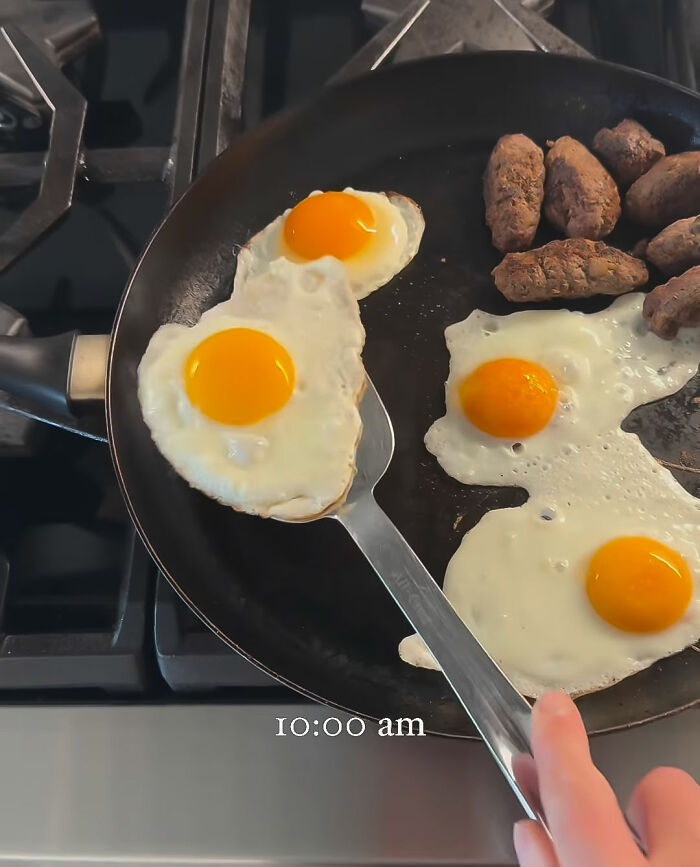
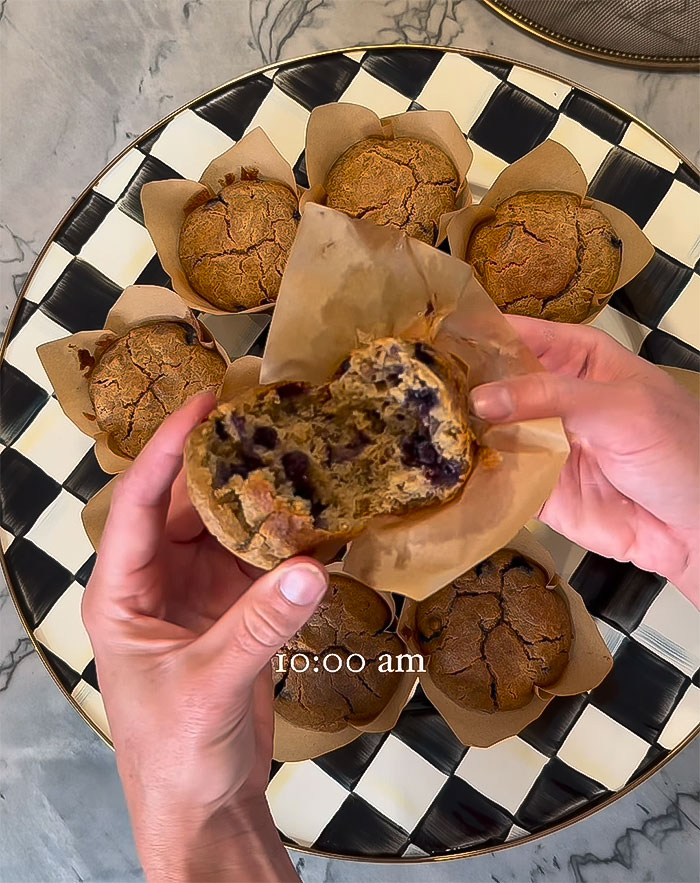
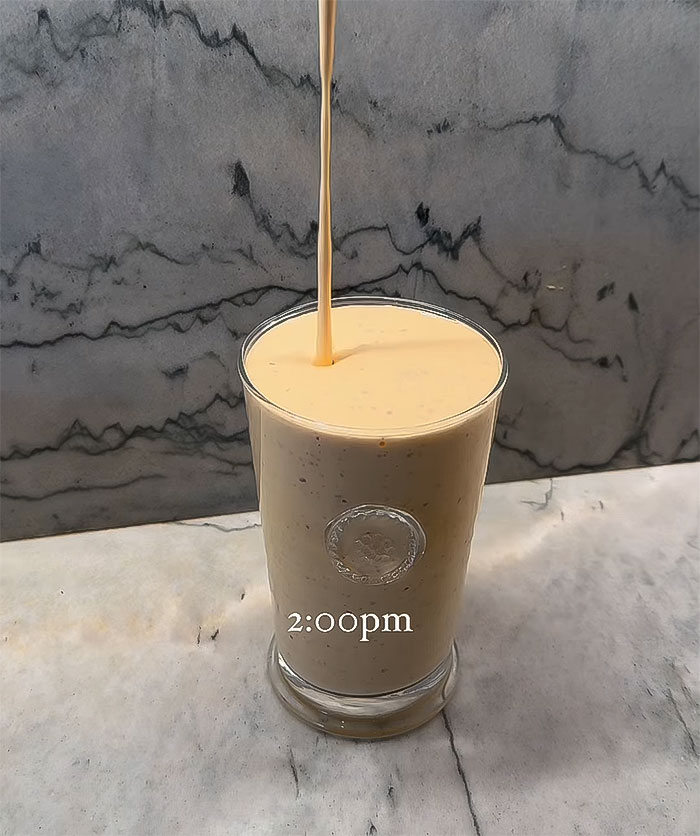
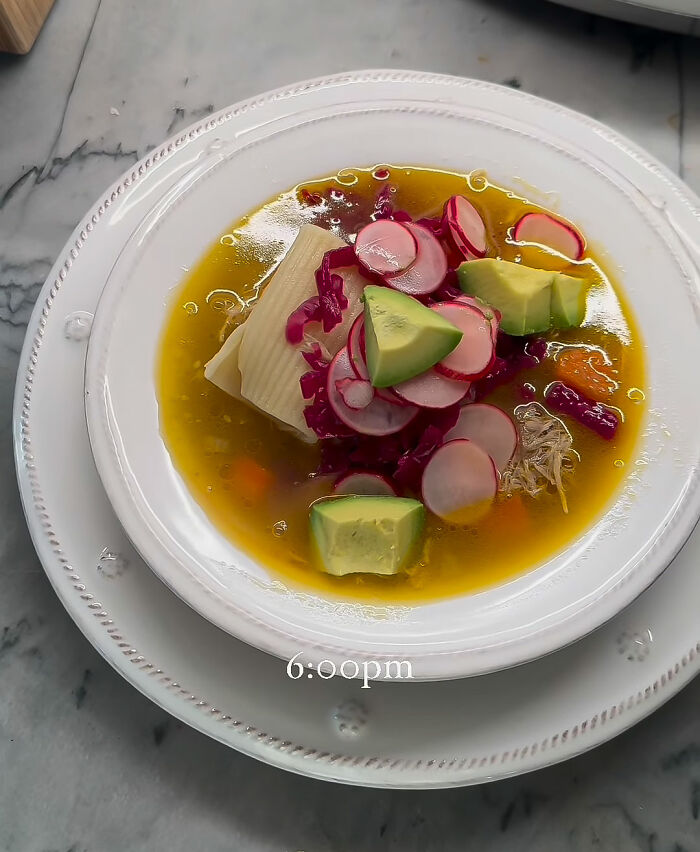
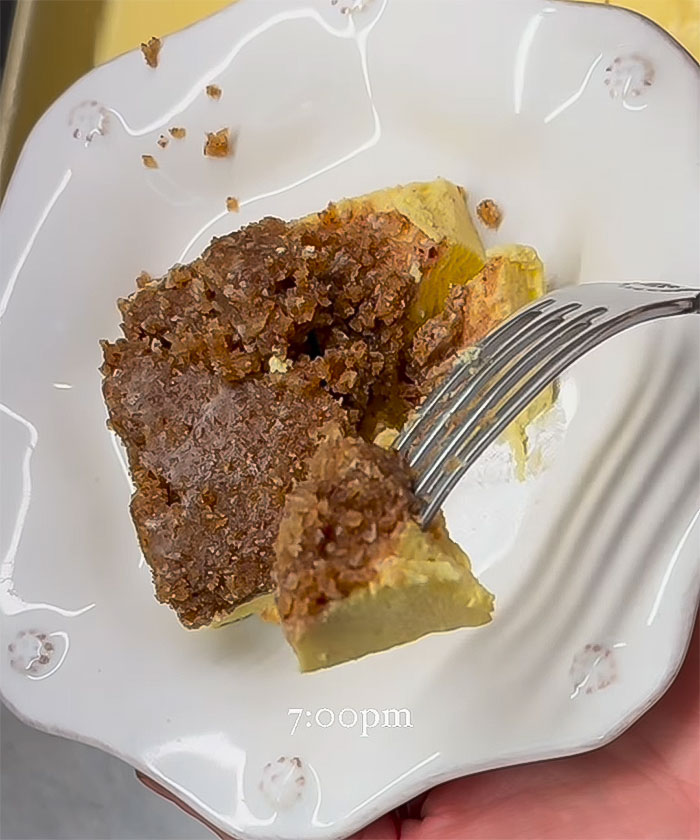





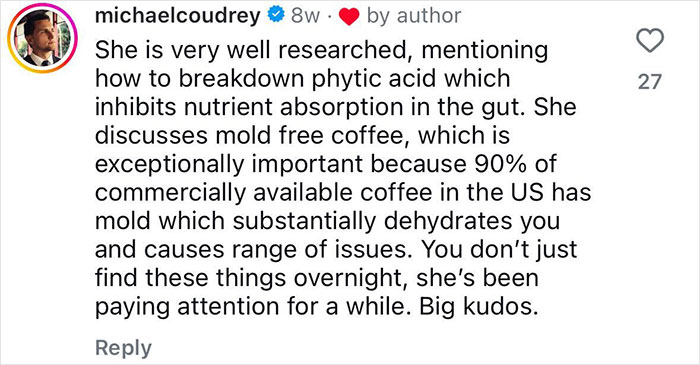















































-86
52